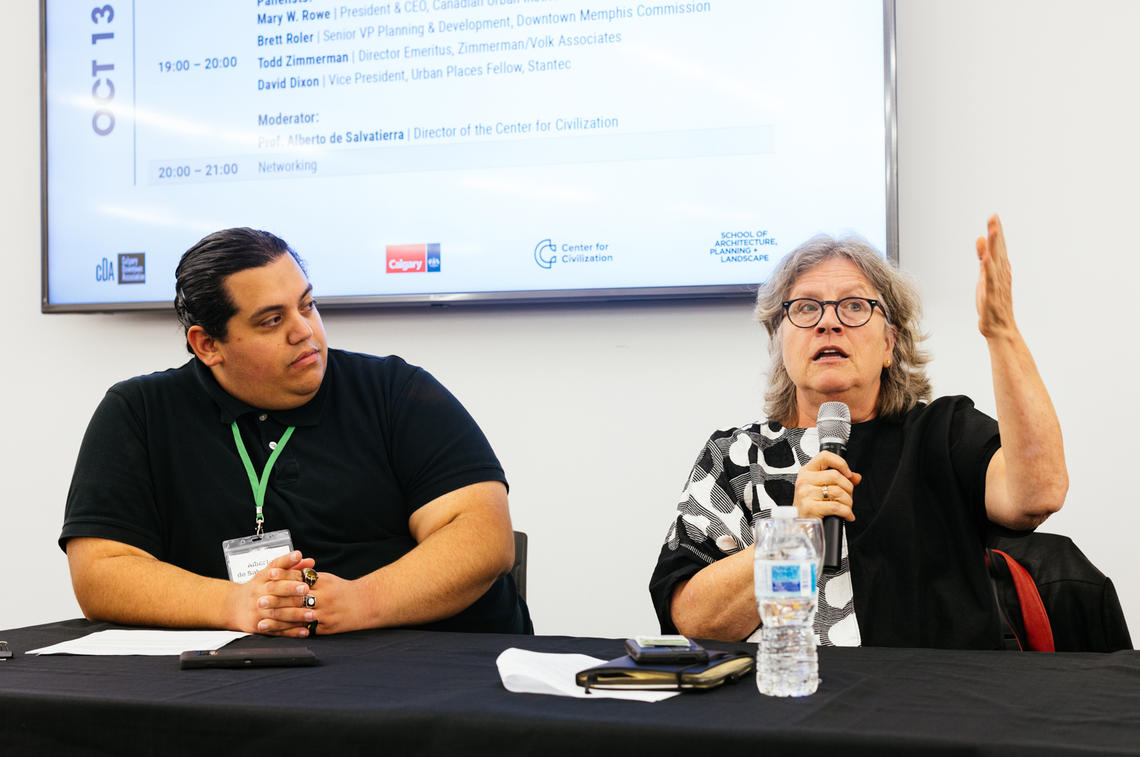Nov. 3, 2022
Dynamic people provide the bedrock for downtown redevelopment

Worrying less about architectural beauty and more about human opportunity is the secret to reigniting the neglected western end of downtown Calgary.
That was one key notion put forth by a panel of experts speaking at the culmination of a three-day charette focused on west-end redevelopment, and Mary W. Rowe, one of North America’s leading urban advocates, says it would be a mistake for Calgary to put aesthetics over the ability for all people to live and work there.
“I really encourage you, do not put an over premium on beauty,” said Rowe, president and CEO of Canada’s Urban Institute and former executive vice-president of New York City’s Municipal Art Society.
“When I moved to New York, Brooklyn was ugly — it still is — but Brooklyn is one of the most dynamic, unbelievably creative places. Every city you go to, you’ll find a neighbourhood that seems downtrodden and not beautiful, and in it, all sorts of extraordinary stuff is happening.”

Alberto de Salvatierra and Mary Rowe.
Max Krewiak, courtesy of the Center for Civilization
Brainstorming for a better downtown
The three-day brainstorming session, organized by Stantec in collaboration with The City of Calgary and the Calgary Downtown Association, was capped by a reception and panel hosted by UCalgary’s School of Architecture, Planning and Landscape (SAPL).
Rowe was talking specifically about one theme raised at the charette, which was embracing the assets already in place, whether old (and possibly ugly) buildings, or spaces being used by people already.
The consensus for Calgary’s western downtown, dominated by car dealerships and giant parking lots, is to create a place available to all Calgarians, especially those who may not currently be able to afford urban living.
Foot traffic and fiscally welcome
Walkable, fiscally attractive to creative people and lower-income families, and environmentally sustainable — these were other key areas seen as priorities during the charette, and further discussed by the panel.
Hall of Fame architect David Dixon says Calgary has a chance to make the west end environmentally free of car culture, while saving society millions in health-care payments.
“(After climate change) the other crisis that we have that we don’t talk about enough, and is really linked to climate change in that they both share the same solution, which is walkable density, is health,” said Dixon, vice-president, Urban Place Fellow at Stantec.
“Folks who live in auto-dependent environments have much poorer health data than folks who live in urban centres — you can add 10 years to somebody’s life span by moving them to an urban environment.”
Data-driven discussion on west-end future
MC'd by Alberto de Salvatierra, director for the Centre for Civilization (CFC) and assistant professor at SAPL, the west-end brainstorming session followed days of discussion over the future of the neglected west end.
"The CFC offered charette participants access to our data in the form of briefing reports as a departure point for conversations about possible strategic interventions that could take place in the neighborhood,” says de Salvatierra.
“The CFC also provided a team of 32 graduate research assistants to listen in on every worktable at each session about the ideas being generated across all three days of the event.
“We took 150 pages of notes that we will be summarizing and putting together, along with Stantec, into a report about the event.”
It’s not UCalgary’s first look at the future of downtown Calgary: SAPL has already catalogued roughly 1,600 under-utilized spaces in the downtown and Beltline areas in a data-driven focus on solutions for economic recovery, downtown reinvention and the transformation of under-used private and public space.














